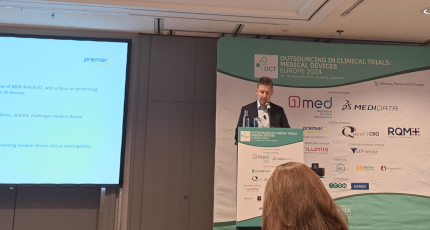
A clinical investigation may not be mandatory for Implantable and Class III medical devices under Article 61(4)-(6) of the European Union Medical Device Regulation (EU MDR) if one of four cases apply to the device under evaluation, said John Thomas, director of program delivery of MedTech at Premier Research.
With the EU MDR becoming fully applicable to all medical devices in Europe from 27 May, the new regulations were at the centre of talks at the Outsourcing in Clinical Trials: Medical Devices Europe 2024 conference in Munich, Germany on 30-31 January.

Discover B2B Marketing That Performs
Combine business intelligence and editorial excellence to reach engaged professionals across 36 leading media platforms.
Thomas detailed the four cases where a clinical investigation is not mandated for Class III and implantable devices under the EU MDR. First, is the case where the device under evaluation is a ‘design modification’ of a device already marketed by the same manufacturer. In this instance, equivalence needs to be demonstrated in compliance with the MDR Annex XIV Section 3 and be endorsed by a notified body (NB).
Here, a clinical evaluation is sufficient to demonstrate the conformity of the modified device with the relevant general safety and performance requirements (GSPRs). Although clinical investigation is not mandatory in this case, a post-market clinical follow-up (PMCF) study is required to demonstrate the safety and performance of the device, said Thomas.
Another instance where a manufacturer is not mandated to conduct a clinical investigation is if it has a contract with another manufacturer with an equivalent device and the partnership allows the former full access to the technical documentation to establish equivalence with the marketed device, where equivalence is demonstrated compliant with MDR Annex VIX section 3 and endorsed by a NB and the clinical data from the equivalent device is sufficient to support the intended purpose of the ‘Device Under Evaluation’. Here, as in the previous instance, a PMCF study is required to demonstrate the safety and performance of the device.
Medical device manufacturers can also be exempted from mandated clinical investigations either their device has been lawfully placed on the market, or put into service under directives 90/385 or 93/42/EEC. The device manufacturers can also escape the mandated clinical investigations should their device be listed on the well-established technology (WET) list in Article 61(6)(b) of the EU MDR.

US Tariffs are shifting - will you react or anticipate?
Don’t let policy changes catch you off guard. Stay proactive with real-time data and expert analysis.
By GlobalDataThomas added that if none of the four cases under Article 61(4)-(6) EU MDR are applicable, a clinical investigation(s) is mandatory for implantable and Class III devices. A guidance document on the issue has been published by the Medical Device Coordination Group (MDCG) in December 2023.
Thomas closed by adding manufacturers should ask themselves, what can be conducted by their own resources, and what may need to be supported by partnering organization, which has clinical product development capabilities and can manage regulatory compliance, be suitably qualified with subject matter expertise who can offer systems and processes to bring solutions to any challenges of any stage of the device lifecycle.





